Glossopharyngeal neuralgia
Cranial mononeuropathy IX; Weisenberg syndrome; GPN
Glossopharyngeal neuralgia is a rare condition in which there are repeated episodes of severe pain in the tongue, throat, ear, and tonsils. This can last from a few seconds to a few minutes.
Causes
Glossopharyngeal neuralgia (GPN) is believed to be caused by irritation of the ninth cranial nerve, called the glossopharyngeal nerve. Symptoms usually begin in people over age 50.
In most cases, the source of irritation is never found. Possible causes for this type of nerve pain (neuralgia) are:
- Blood vessels pressing on the glossopharyngeal nerve
- Growths at the base of the skull pressing on the glossopharyngeal nerve
-
Tumors
or infections of the throat and mouth pressing on the glossopharyngeal nerve
Tumors
A tumor is an abnormal growth of body tissue. Tumors can be cancerous (malignant) or noncancerous (benign).
Read Article Now Book Mark Article
Symptoms
The pain usually occurs on one side, and may be jabbing. In rare cases both sides are involved. Symptoms include severe pain in areas connected to the ninth cranial nerve:
- Back of the nose and throat (nasopharynx)
- Back of the tongue
- Ear
- Throat
- Tonsil area
- Voice box (larynx)
The pain occurs in episodes and may be severe. The episodes can occur many times each day, and awaken the person from sleep. It can sometimes be triggered by:
- Chewing
- Coughing
- Laughing
- Speaking
- Swallowing
- Yawning
Exams and Tests
Tests will be done to identify problems, such as tumors, at the base of the skull. Tests may include:
- Blood tests to rule out any infection or tumor
-
CT scan
of the head
CT scan
A computed tomography (CT) scan is an imaging method that uses x-rays to create pictures of cross-sections of the body. Related tests include:Abdomin...
 ImageRead Article Now Book Mark Article
ImageRead Article Now Book Mark Article -
MRI of the head
MRI of the head
A head MRI (magnetic resonance imaging) is an imaging test that uses powerful magnets and radio waves to create pictures of the brain and surrounding...
 ImageRead Article Now Book Mark Article
ImageRead Article Now Book Mark Article -
X-rays of the head
or neck
X-rays of the head
A skull x-ray is a picture of the bones surrounding the brain, including the facial bones, the nose, and the sinuses.
 ImageRead Article Now Book Mark Article
ImageRead Article Now Book Mark Article
Sometimes the MRI may show swelling (inflammation) of the glossopharyngeal nerve.
To find out whether a blood vessel is pressing on the nerve, pictures of the brain arteries may be taken using:
-
Magnetic resonance angiography
(MRA)
Magnetic resonance angiography
Magnetic resonance angiography (MRA) is an MRI exam of the blood vessels. Unlike traditional angiography that involves placing a tube (catheter) int...
Read Article Now Book Mark Article - CT angiogram
- X-rays of the arteries with a dye (conventional angiography)
Treatment
The goal of treatment is to control pain. The most effective drugs are antiseizure medicines such as carbamazepine. Antidepressants may help certain people.
In severe cases, when pain is difficult to treat, surgery to take pressure off the glossopharyngeal nerve may be needed. This is called microvascular decompression. The nerve can also be cut (rhizotomy). Both surgeries are effective. If a cause of the neuralgia is found, treatment should control the underlying problem.
Outlook (Prognosis)
How well you do depends on the cause of the problem and the effectiveness of the first treatment. Surgery is considered effective for people who do not benefit from medicines.
Possible Complications
Complications of GPN may include:
- Slow pulse and fainting may occur when pain is severe
- Damage to the carotid artery or internal jugular artery due to injuries, such as a stab wound
- Difficulty in swallowing food and speaking
- Side effects of the medicines used
When to Contact a Medical Professional
See your health care provider right away if you have symptoms of GPN.
See a pain specialist if the pain is severe, to be sure that you are aware of all your options for controlling pain.
References
Rucker JC, Thurtell MJ. Cranial neuropathies. In: Daroff RB, Jankovic J, Mazziotta JC, Pomeroy SL, eds. Bradley's Neurology in Clinical Practice . 7th ed. Philadelphia, PA: Elsevier; 2016:chap 104.
Waldman SD. Glossopharyngeal neuralgia. In: Waldman SD, ed. Atlas of Uncommon Pain Syndromes . 3rd ed. Philadelphia, PA: Elsevier Saunders; 2014:chap 19.
Zakrzewska JM, Chen HI, Lee JYK. Trigeminal and glossopharyngeal neuralgia. In: McMahon SB, Koltzenburg M, Tracey I, Turk DC, eds. Wall and Melzack's Textbook of Pain . 6th ed. Philadelphia, PA: Elsevier Saunders; 2013:chap 66.
-
Glossopharyngeal neuralgia - illustration
Glossopharyngeal neuralgia is believed to be caused by irritation of the ninth cranial nerve. The condition is marked by repeated episodes of severe pain in the tongue, throat, ear, and tonsils, which can last from a few seconds to a few minutes.
Glossopharyngeal neuralgia
illustration
-
Glossopharyngeal neuralgia - illustration
Glossopharyngeal neuralgia is believed to be caused by irritation of the ninth cranial nerve. The condition is marked by repeated episodes of severe pain in the tongue, throat, ear, and tonsils, which can last from a few seconds to a few minutes.
Glossopharyngeal neuralgia
illustration
Review Date: 5/30/2016
Reviewed By: Amit M. Shelat, DO, FACP, Attending Neurologist and Assistant Professor of Clinical Neurology, SUNY Stony Brook, School of Medicine, Stony Brook, NY. Review provided by VeriMed Healthcare Network. Also reviewed by David Zieve, MD, MHA, Isla Ogilvie, PhD, and the A.D.A.M. Editorial team.

